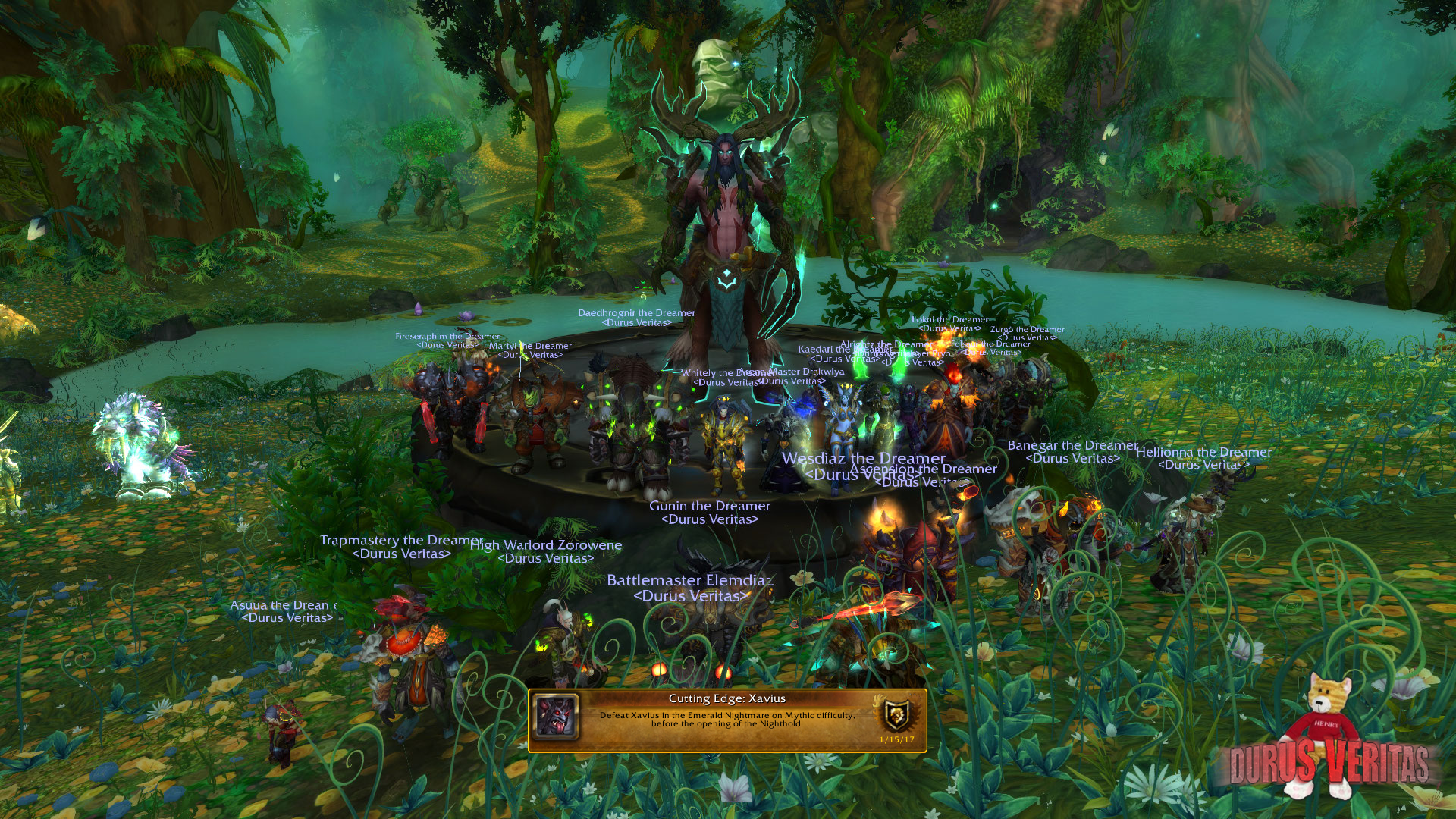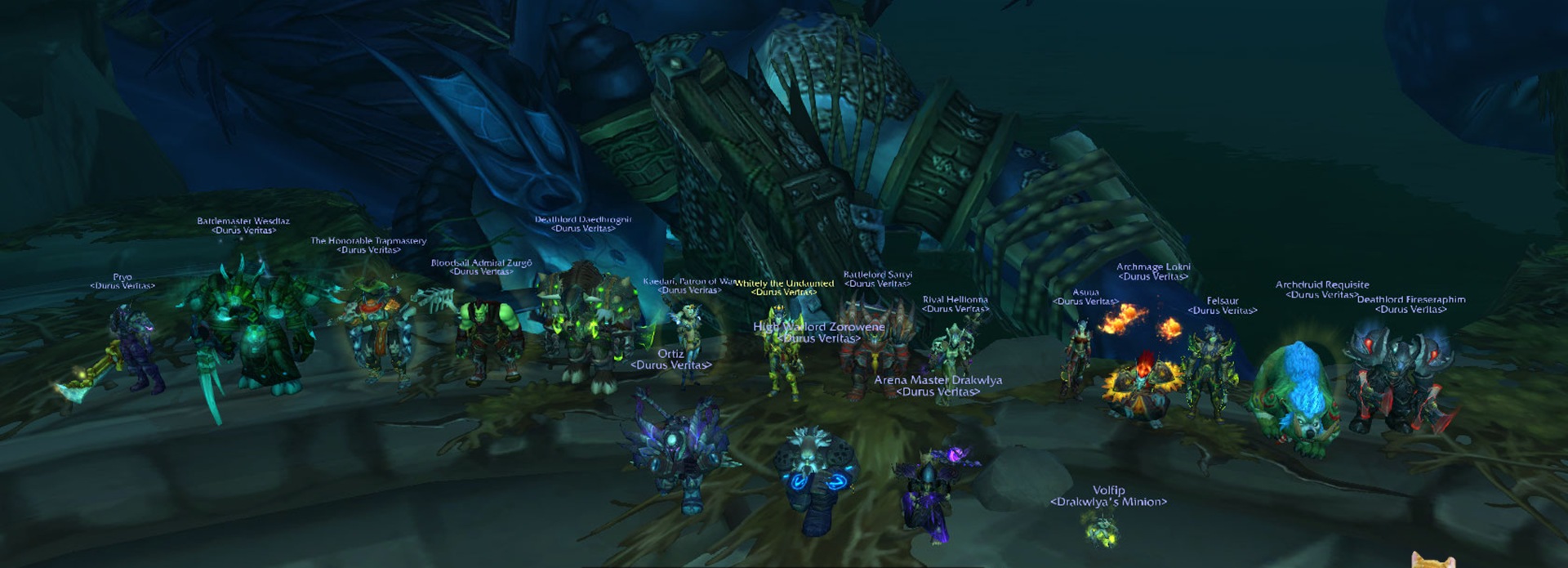How a guild of deaf players conquered World of Warcraft's toughest raids
Without voice chat, WoW's raids are difficult—but Undaunted has proven they're not impossible.

Joseph Antle has raided World of Warcraft for a long time. His first guild was called Blackguard in vanilla, and he carved his way through Molten Core, Blackwing Lair, and Ahn’Qiraj with his trusty Tauren hunter. “I can’t recall if I was any good back then, but I have a memory of accidentally pulling Hakkar and wiping the entire group,” he says. “The team wasn’t too pleased with me, but I got over it.”
You can’t understate the coordination demanded by high-tier Warcraft raids. You and 24 friends are the only things standing in front of a boss deemed too difficult for the vast majority of the player base. Each encounter cycles through four or five central mechanics that need to be handled perfectly. If you do something dumb, like forget you’re the living bomb, or stumble through the Flame Wreath, or accidentally aggro the Blood God Hakkar, you’re looking at a long walk back from the graveyard.
Most serious raiding guilds use voice chat to bark orders or refine strategy between wipes. In an age of Discord, built-in microphones, and automatic audio channels, connecting with your fellow players outside the chat box is easier than ever. But Antle is deaf, and wasn’t afforded the luxury of coordinating over voice comms. He still plucked ultra-rare loot off of Warcraft’s fiercest horrors, but his experience was far more isolated—the only guy in the group left out of all the jokes.
There would be encounters where I was given a very easy task because they believed Vent was necessary.
“I must say that it was boring, and I felt isolated due to nobody participating in chat since everybody else were using vent to communicate. When it came to strategies, one of the officers would whisper me something like ‘you’re on moon marker’ or ‘you’re third to dispel the enrage on Chromaggus boss,’” says Antle. “Sometimes mechanics weren’t too difficult so I could just focus on survival and killing the boss, and sometimes there would be encounters where I was given a very easy task because they believed vent [once the most popular voice chat program] was necessary.”
World of Warcraft is a social game, especially when it comes to raiding. The friends and alliances you form over a really difficult boss can last a lifetime. Unfortunately, Antle was missing out on that part of the glory. You shouldn’t ever feel alone after the jubilation of a server-first. But that changed in 2013 when he joined Undaunted.

A small community of deaf players who knew each other outside WoW formed the Undaunted guild (known until recently as Durus Veritas) in the spring of 2011. All of them had experience raiding, and wanted to use their skills to clear high-end Warcraft encounters without voice chat. And they were successful, progressing through the stringent demands of Cataclysm, Mists of Pandaria, and Warlords of Draenor. On January 15, 2017, they cleared the Emerald Nightmare on the highest difficulty—the first major raid of the Legion cycle.
Antle was recruited into Undaunted in 2013 by a close friend who needed a DPS for their alternative 10-man team. Today he’s guild master, playing a Blood Elf protection paladin.
The biggest gaming news, reviews and hardware deals
Keep up to date with the most important stories and the best deals, as picked by the PC Gamer team.
How Undaunted raids
Undaunted put in a lot of prep work. They require a bevy of helpful PvE mods like Bigwigs and WeakAura, which help their raiders recognize boss mechanics with heads-up text notifications. But outside of that, a lot of the nuts and bolts of crucial moments are banged out in chat. That can get pretty difficult, considering that even relatively easy bosses like Mythic Nythendra can potentially mind-control seven raid members at once. You have not lived until you’ve tried to negotiate pure chaos with only a keyboard.
“If a tank forgot to taunt a boss to deal with debuffs, the other tank would quickly type in ‘taunt’ as a reminder,” says Antle. “Setting up assignments before raid encounters is what we always do, especially the order of healing cooldowns. Without those assignments, we would have gone nowhere. After first wipes, our players typically memorized their tasks, and it becomes a matter of honing our raid awareness and knowledge of the fight.”
Blizzard has designed hundreds of raid encounters in Warcraft’s lifecycle. Most of these are harder and more frustrating without voice communication, but they aren’t impossible. Undaunted work extremely hard, constantly chatting about raids in the community Discord, and even with their handicap, they’re still more successful than your average guild. Antle tells me their biggest hindrance is the downtime after a wipe. It takes a lot of time to type out technical strategic adjustments instead of just discussing them on an open line. I ask him if there’s ever been a boss that felt abnormally unfair to the deaf community. Only one came to mind.
“Mythic Xavius. If someone dies right before it’s their turn to enter the dream, it’s a wipe,” says Antle. “That’s because if nobody enters a dream pillar the portal spawns an add, complicating the raid and putting more stress on healers and DPS. If we could call out somebody to take a dead player’s spot, it’d be a lot more manageable.”
It’s hard to ask Blizzard to limit their design space in order to make sure deaf players don’t get screwed on a finicky boss. But I really, really hope they never publish an encounter that requires a keen ear. There are so many games that fall flat for the deaf community—from the tense, spleen-squeezing footsteps of Rainbow Six: Siege, to audio-visual feasts like Thumper, to the distant audible clues baked into Riven and Myst. Hearing is something we take for granted.
We may be sympathetic towards deafness, but it’s a rare condition, and one games rarely take into consideration. So many games include a specific option for color-blind people, but when’s the last time you’ve seen a mechanic tweaked for the hearing-impaired?
Recently there was a post on the Overwatch subreddit from a deaf player complaining about the lack of subtitles attached to ultimates. It’s something you probably never think about, but competitive multiplayer gets a lot more frustrating when you can’t hear Symmetra announce her teleporter, or Junkrat launch his RIP-tire. Whether intentionally or not, World of Warcraft has managed to avoid anything game-breaking so far.
"It's a hard question to answer, considering we don't exactly know what we're missing out on."
Joseph Antle on support for deaf players
“Maybe subtitles of noises that indicate the coming of a mechanic,” says Antle, when I ask him what improvements Blizzard could make for deaf players in Azeroth. “It’s a hard question to answer, considering we don’t know exactly what we’re missing out on.”
Ultimately, Undaunted raiders enjoy the satisfaction of succeeding against the odds. Killing a dragon is always sweet, but killing it without a microphone is uniquely satisfying. They were the odd man out in other guilds all over World of Warcraft, but they found each other, and built their own rules. Antle remembers the first time he joined Undaunted’s ranks, shocked by the sudden liveliness of the green Guild chat filling his screen. Finally his partners weren’t sequestered away in voice chat. Finally he wasn’t giving remedial assignments from his raid leader. Finally World of Warcraft was a true co-operative experience.
"We’re especially proud that we have managed to clear the content without any kind of assistance such as voice communication. Most of our raiders have exceptional awareness and remember the assignments given to them beforehand,” says Antle. “We currently have 9/10 heroic bosses cleared in Nighthold, and we’re ranked eighth [out of 120] on the realm according to WoWProgress. I think that’s a wonderful accomplishment for us, but it’s not over yet. We will keep pushing as much as possible.”

Luke Winkie is a freelance journalist and contributor to many publications, including PC Gamer, The New York Times, Gawker, Slate, and Mel Magazine. In between bouts of writing about Hearthstone, World of Warcraft and Twitch culture here on PC Gamer, Luke also publishes the newsletter On Posting. As a self-described "chronic poster," Luke has "spent hours deep-scrolling through surreptitious Likes tabs to uncover the root of intra-publication beef and broken down quote-tweet animosity like it’s Super Bowl tape." When he graduated from journalism school, he had no idea how bad it was going to get.

